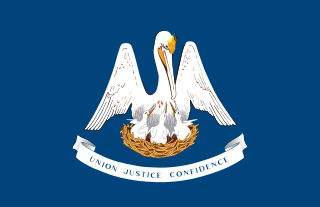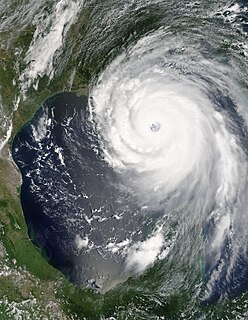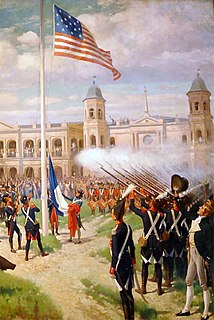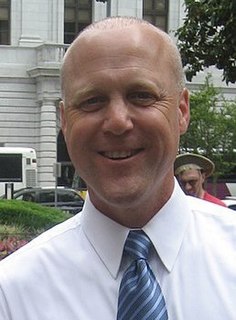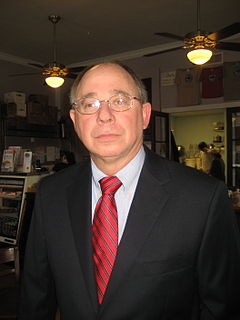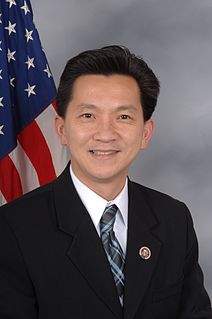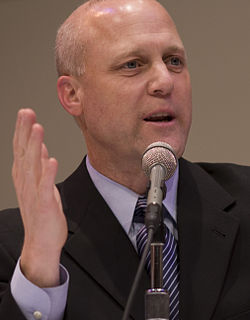Primary
December, January, and February saw intense speculation among political observers as to who would emerge as Nagin's main rival in the upcoming campaign. It was expected that either Ron Forman or Mitch Landrieu would run with the support of much of the city's business and political communities. After months of private discussion and negotiation, both candidates decided to run; an unexpected development which had the potential to split the support of voters opposed to Nagin.
On January 24, Louisiana Governor Kathleen Blanco ended months of public debate and legal wrangling by signing Secretary of State Al Ater's plan to reschedule the primary election for April 22 and the runoff for May 20. [27]
Ron Forman officially declared his candidacy on February 14 at the Audubon Tea Room in front of a crowd of business leaders and other supporters. [28]
On February 22, Mitch Landrieu made his long-anticipated official campaign announcement, with players in the city's hospitality and tourism industry and powerful real estate developer Pres Kabacoff featured prominently among his supporters.
On February 23, Nagin held a public reconciliation with Bishop Paul Morton, a prominent black pastor who publicly criticized Nagin in 2004 for failing to provide enough city contracts to black-owned businesses, and had called Nagin "a white man in black skin."
On February 24, the first public poll of the election was released. Conducted between January 26 and February 13, the poll showed Mitch Landrieu leading with 35% of the vote and Ray Nagin trailing with 25%. Ron Forman received 9% and Peggy Wilson stood at 7%. However, only residents who had returned to the city were polled; without the input of absentee voters, the pollster acknowledged that the results could not be considered representative. [29]
March 2 saw the release of the election's second poll, conducted by CNN, USA Today, and Gallup. 19% of those polled said they would definitely vote for Ray Nagin, while 44% said they would definitely not vote for him. Mitch Landrieu received 18% definite support, while 29% would definitely not vote for him. Ron Forman stood with 12% of those polled certain to vote for him, and 35% unwilling to consider voting for him. Peggy Wilson received the definite support of 7%, and 62% would not vote for her. 4% would definitely vote for Tom Watson, while 63% would not vote for him. Other candidates were not mentioned in the poll, and only voters currently living within the city were polled. [30]
March 3 was the deadline for mayoral candidates to file their qualification papers. In addition to the expected candidates, a large number of newly announced candidates emerged. The most notable surprise announcement was that of Clerk of Criminal Court Kimberly Williamson Butler, who emerged from a week of hiding from an arrest warrant for contempt of court in order to announce her candidacy for mayor. A record number of 23 candidates have declared their intention to challenge Nagin. [31]
On March 4 Nagin appeared before an audience of New Orleans evacuees at an event organized by the NAACP, where he made the statement that "there was all this talk about this being an opportunity to change New Orleans forever and maybe everybody shouldn't come back, and maybe this is an opportunity to kind of change New Orleans and go back to what it used to be. I have 23 candidates running for mayor and very few of them look like us. There's a potential to be a major change in the political structure of New Orleans." Some perceived these comments to be a divisive follow-up to his "Chocolate City" remarks, while others point out that the fact that Nagin is the only major African-American candidate in a field of 23 is a sign of the demographic shift in a city that was over two-thirds black before Katrina.
Newly announced candidate Kimberly Williamson Butler, the Clerk of Criminal Court, was jailed for contempt of court on March 6 after a court appearance in which she refused to admit guilt and instead criticized the judges. [32]
The first mayoral debate of the campaign was held on March 7 at Loyola University. The debate was attended by Ray Nagin and 8 of his challengers: James Arey, Virginia Boulet, Rob Couhig, Ron Forman, Mitch Landrieu, Leo Watermeier, Tom Watson, and Peggy Wilson. Kimberly Williamson Butler was invited, but could not attend due to her jail sentence. The candidates discussed levees and hurricane evacuation plans, housing and redevelopment of neighborhoods, the role of the state and federal government in the rebuilding of the city, and the issue of race in a city with drastically altered demographics. The two main challengers, Forman and Landrieu, were perceived as largely playing safe, while other candidates, particularly Couhig and Wilson, were more combative. Ray Nagin focused on defending his record and emphasizing the need for experienced leadership in a time of crisis. [33]
State campaign finance reports were released on March 25 showing candidates' finances as of March 13. The major candidates had amassed campaign funds several times greater than those raised in recent elections, making this mayoral election the city's most expensive in history. Incumbent mayor Nagin had the most well-financed campaign, with $1,182,776 available; Ron Forman followed closely with a $1,002,692 war chest. Mitch Landrieu had the third largest campaign fund, at $547,003. Rob Couhig had raised a significant amount - $131,535 - but had already spent it. [34]
The second mayoral debate was held on March 27. Only the perceived front-runners - Nagin, Forman, Landrieu, Watson, Wilson, Boulet, and Couhig - were invited. Discussion was focused on housing restoration, fiscal management, flood protection, and crime. The second debate was more combative than the first, with the three leading candidates facing strong criticism from the others.
A new poll released on April 7 reinforced the common perception that the election is shaping up to be a three-way race. Landrieu and Nagin appeared to be in a dead heat, with the lieutenant governor leading with 27% over the incumbent mayor's 26%. Forman remained in third place with 16%, but he appeared to be rapidly closing the gap between himself and the front-runners when compared with previous polls. Like previous polls, these latest numbers only included current residents of New Orleans; without taking displaced voters into account, their accuracy remained questionable. [35]
In the final days of the primary campaign, a wave of negative campaign ads emerged. The clash began on April 7 with Forman accusing Landrieu of supporting tax increases; Landrieu countered with criticisms of Forman's handling of public money and of his high salary at the Audubon Institute. Forman continued his attacks by accusing Landrieu of being soft on crime. These attacks have been interpreted as efforts by Landrieu and Forman to position themselves to win a slot in the runoff against Nagin. Meanwhile, Wilson accused both Landrieu and Forman of being 'liberal Democrats' and of being complicit in the corruption of former mayor Marc Morial. [36] Couhig, Watson, and Forman battled over the support of conservative and Republican voters; Forman urged voters not to waste their votes on minor candidates, while Couhig stepped up his attacks on Forman, painting him as a liberal no different from Landrieu or Nagin. [37]
As of April 14, the Forman campaign had raised the most money, with over $2.1 million in his campaign chest. Landrieu had raised just under $2 million, while Nagin had raised $1.46 million. Couhig had raised $395,000, Boulet had amassed $268,000, Wilson had $101,000 and Watson $85,000. [38]
On April 17, the major candidates—Boulet, Couhig, Forman, Landrieu, Nagin, Watson, and Wilson—appeared on a nationally televised debate co-hosted by Chris Matthews and New Orleans newsanchor Norman Robinson. The debate was televised nationally over MSNBC, an exceedingly rare occurrence for a local mayoral campaign; this was done because of many New Orleans voters still living elsewhere in the aftermath of Katrina and due to national interest. [39]
On 22 April preliminary results showed Nagin with 38% of the vote, with 41,489 votes, and Landrieu with 29% and 31,499. On May 20, a runoff election between Nagin and Landrieu took place. Forman with 17% and 18,734 votes conceded defeat; Couhig came in fourth with 10% and 10,287 votes.
Runoff
In the runoff campaign, few substantive policy differences emerged between Landrieu and Nagin. Instead, the main issues in the runoff campaign were differences in personality and governing styles.
Alongside stressing his accomplishments in bringing jobs to New Orleans before the storm, Nagin's campaign emphasized the decisive role the mayor played in the aftermath of Katrina and the importance of the relationships he has built with state and federal leaders. The incumbent also stressed the risk of "experimenting" with a new mayor at the start of another hurricane season. Nagin criticized Landrieu's "old-style politics" and implied that he had ties to past politicians like Marc Morial.
Landrieu emphasized his record in the state legislature and as Lieutenant Governor, and his ability to build consensus among a broad range of political players. For their part, the Landrieu campaign criticized Nagin's go-it-alone governing style as alienating to New Orleans's potential allies, and his frequent gaffes as embarrassing to the city. Landrieu said he would restore credibility to city government and jump-start a lethargic rebuilding process: a major Landrieu slogan was "What was OK before Katrina isn't OK after Katrina." Landrieu ads featured shots of the city's abandoned flooded cars and blamed Nagin for his lack of leadership. [40]
In the runoff, Landrieu received endorsements from third-place primary finisher Ron Forman, as well as the city's police and fire organizations and District Attorney Eddie Jordan. Nagin was endorsed by Rob Couhig, who appeared in Nagin ads praising the mayor's pro-business credentials. Other Nagin endorsements included defeated candidates Virginia Boulet and Tom Watson (who vehemently criticized Nagin in the primary), as well as congressman Bill Jefferson and state senator Cleo Fields.
The runoff campaign was also affected by the May 9 release of the first major book about Katrina: historian Douglas Brinkley's The Great Deluge. The book offers a scathing portrayal of Nagin's performance in the week after Katrina, describing him as a man on the verge of breakdown, hiding in the Hyatt hotel and refusing to emerge to take decisive action. Nagin described the book as a "political satire" that twisted the facts, and criticized the timing of its release as politically motivated. [41]





